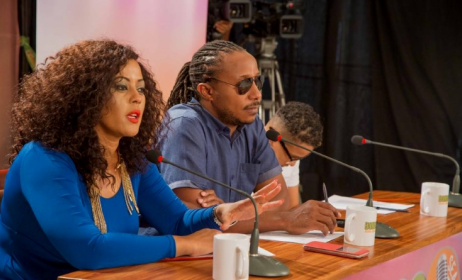An interview with Isack Abeneko ahead of his European tour
Isack Abeneko has been playing for 12 years and his guitar, he says, has been a constant companion. A young musician with an old soul and the sound of traditional Tanzanian music surging through his veins, Abeneko will be heading to Europe for a tour from 18 June to 7 July.
 Tanzanian musician and contemporary dance choreographer Isack Abeneko. Photo: Erick Mlindima.
Tanzanian musician and contemporary dance choreographer Isack Abeneko. Photo: Erick Mlindima. Isack Abeneko. Photo: Tadhi Alawi
Isack Abeneko. Photo: Tadhi Alawi
During the past decade, Tanzania’s music has achieved a continental status that has seen a handful of artists making pop music, also known as bongo flava, an immensely wealthy industry. However, the same cannot be said for musicians making live music. Many find themselves victims of a financial squeeze.
Abeneko says the fronting of bongo flava music is slowly killing the country’s live music industry, leaving the key symbol of culture and heritage nothing more than a faded relic.
The 1980s up to the late-1990s were the epitome of live music in Tanzania. The era had many live music venues and bands played across the country, the region and abroad, driving a booming local industry and birthing icons like Mbaraka Mwinshehe and the Morogoro Jazz Band, Remmy Ongala and Orchestra Super Matimila, DDC Mlimani Park Orchestra and Juwata Jazz, among others.
For the current live music industry to return to its former glory, Abeneko believes both society and local entertainment business owners need to embrace contemporary musicians. He adds that companies should also include these artists in their branding campaigns.
Music In Africa spoke to Abeneko over the phone about the current state of live music in Tanzania ahead of his tour, and he said, “We’re excited to play in Europe and hope that this will be a trend,” and citing ‘Nyakoni’ and ‘Mama Chambewa’ as two songs that he was specifically looking forward to playing live.
MUSIC IN AFRICA: You are about to take off on a particularly grueling-looking tour. Did you organise all of that yourself?
ISACK ABENEKO: First, I must say that I am very excited about it. The process of organising for this tour started last year in September. I did not single-handedly make this happen because I have my management team, Weka Music Production and Management. However, I am the one who approached most of the music promoters, bookers, venues and fellow artists in Europe.
Well done. So what do you expect to get out of the tour?
First, I consider myself an ambassador of Tanzanian culture; therefore, my agenda will be to promote our cultural music and present Tanzania’s Afro-fusion music to international audiences. Secondly, I see this as a journey that should continue to other places. Therefore, I expect to expand my network to be able to organise the next 2020 tour with more opportunities promotion of the new album that will be released in May 2020. It is also my dream to meet people that would be interested in working with me in the near future.
Apart from the tour, you will also be conducting workshops. What will they entail?
Apart from singing, I am also a contemporary dance choreographer. Therefore, I thought as we play our music, we might as well take time to engage the audience on the authentic dances of Tanzania. We will meet several dance students, teachers and dance enthusiasts. We are looking forward to the experience and fielding their questions.
There is no doubt that you have put much effort into making this tour both a success and culturally relevant - not every artist can pull this off. Why do you think many Tanzanian artists are yet to break out and perform outside the continent?
As an artist, I believe meeting new people in music from different geographical locations contributes to one’s growth in the music sector. Unfortunately, such opportunities are unheard of in Tanzania. Uganda and Kenya are ahead of us on that. We need platforms that can bridge the gap between music industry professionals across the continent and Tanzanian artists. I believe once they begin to perform outside Tanzania, then it will be much easier to get outside the continent.
But bongo flava artists are crossing borders by collaborating with different artists and staging concerts outside Tanzania, are they not?
Yes, that is true. The current popular music is too commercialised, that means anything mainstream is easy to sell. However, those that appreciate good music know that live music is the real deal.
Indeed. How would you describe your music?
That is an interesting question that I can quickly answer by saying that I like to describe my music as bongo fusion. The word bongo means Tanzania and the fusion comes from the mixing of different traditional music and funk styles to create contemporary music.
Bongo flava is currently popular in the region. Kenyan musicians have also taken it up. What are your thoughts about this genre, whose recent productions lack elaborate arrangements?
I think it is culturally right for Kenyan artists to embrace their own music and culture. Bongo flava is trending mainly because of the biases in the media, which gives it tremendous support. The music promoters also heavily invest in advertising on radio and with DJs.
Apart from the lack of airplay, which other challenges exist within the live music scene in Tanzania?
When it comes to the live and cultural music scene, you will realise there are very few live music venues for artists to stage their performances. The only places you can find a venue or two with a moderate stage for performance are in Dar es Salaam, Bagamoyo, Zanzibar and Arusha. There is also a scarcity of music promoters and agencies which can represent musicians making music affiliated to culture. Lastly, very few sound engineers are qualified to record live music. I must applaud the live music artists for their vigilance because the music scene is growing despite these shortcomings.
What of music education? Is the curriculum good enough to breed great musicians?
This is another challenge. The government must establish a music curriculum specifically designed for traditional music. Now, the curriculum is based on Western music education. Having an African music education curriculum, whereby you study the various styles and instruments, would go a long way in making the upcoming artists appreciate their traditions. I remember when I was in primary school, we had a lesson called 'culture.' During that time I learnt various traditional music and how to play the instruments, but it was only because we had a teacher who valued culture. It was not in the curriculum.
Are these shortcomings the reason why you decided to start your monthly music event? Marafiki Night Live.
Yes. Marafiki Night Live started by Weka Music Production and Management to give more opportunities to upcoming musicians by providing a platform to perform together with experienced musicians. I want to announce that as from next year, we would be launching Marafiki Night Live Festival - so we can begin to programme more musicians from around the region.
What role can the government play?
The thing is, our government does not prioritise culture and even when they are planning the budget for other sectors, culture is always given less attention. It is frustrating to read in the news the corruption and all the money that goes missing, yet no support is given to culture and the creative sector.
Last month, Sauti za Busara received funding from the embassy of Norway in Tanzania for its 2020 edition. Any comment on that?
It is an excellent thing to see how other countries and foreign cultural institutions value arts and culture in Tanzania. I hope that the Tanzanian government will learn something from this action. Because even our first president Mwalimu Julius Nyerere once said, “A nation without a culture is a dead nation.” The government has to support Sauti za Busara because it is playing an essential role in promoting culture and tourism in Tanzania.
What would you tell Tanzanian artists who wish to start touring outside the country?
I would advise my fellow artists to keep working hard by composing new music and rehearsing. It is imperative to have a professional live performance video that can be used for promotion. It is also essential to be a regular social media user because it is where you can meet people and network. Lastly, any serious musician should have an account with Music In Africa so that they cannot miss out on the various opportunities for musicians from around the world.
For more information about Isack Abeneko's European tour dates, click here.


































Comments
Log in or register to post comments